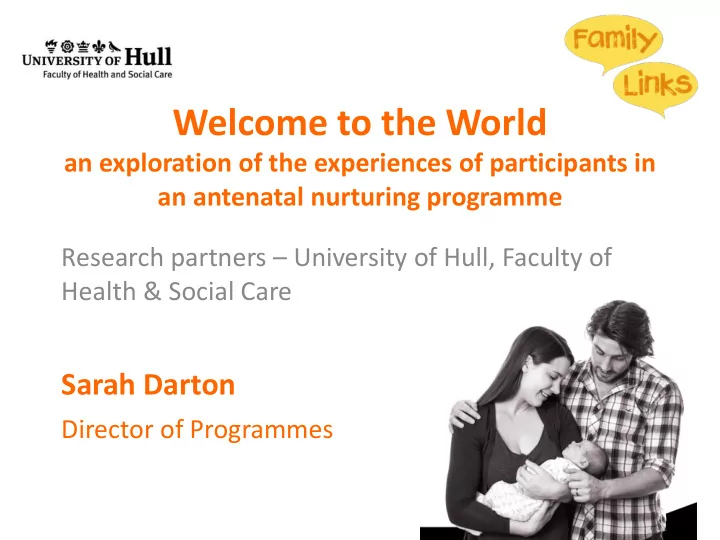

Welcome to the World an exploration of the experiences of participants in an antenatal nurturing programme Research partners – University of Hull, Faculty of Health & Social Care Sarah Darton Director of Programmes
Welcome to the World programme • 8 week manualised programme • Attunement, bonding and attachment, parental wellbeing, breastfeeding and practical care • Targeted or universal • Delivered in children's centres, health centres by trained parent group leaders
National sample • 131 participants, 77 pre and post group, 54 postnatally • 96 women, 35 men • 18 WttW groups, England, Northern Ireland and Wales • 3 time points, pre and post WttW group and 2-3 months postnatally
Aims of the study • To evaluate whether attending the WttW programme improves outcomes for parents-to-be during the transition to parenthood • 4 key areas- Attunement, bonding & attachment, parental wellbeing, breast feeding and practical care • What factors affect the successful implementation • 12 month mixed methods approach September 15 – September 16
Measures: Quantitative • Maternal/Partner Infant Bonding Scale – MIBS • Edinburgh Postnatal Depression Scale (also used antenatally) – EPDS • Parent Coping Scale • Pictorial Representation of Attachment Measure PRAM
Measures: Qualitative • Questionnaires, data collected across 3 time points; T1: Expectations from the course questions T2 : ‘Meeting of expectations and feeling prepared for parenting’ questions T3 : ‘Meeting of expectations and being prepared for parenting ’ questions • Focus group discussions with attendees: the experience of the course
Findings: Quantitative • Significant reduction of MIBS scores - a more positive attitude towards the baby. • Significant decrease in EPDS scores (women) – an increase in psychological wellbeing • Significant increase in the Coping scale • No significant change in PRAM scores
Findings - Qualitative Parents engaging with the programme experienced- • Positive communication between each other • An understanding of their baby’s needs and of their own emotional needs • Increased understanding, role as parents • Increased understanding benefits of breast feeding
Areas/aspects of becoming parents, in which expectant parents felt most prepared at T2 • Interacting with baby • Breastfeeding: maximise their chances of success • Emotional wellbeing: ‘nurturing oneself’, ‘normalising fears’, ‘helping oneself to be mentally prepared’ • Labour and birth: ‘feeling more relaxed and at ease’, helping to prepare couples for what to expect. • Partnerships and relationships: Understanding my partner, listening, working together
Knowledge and Confidence T3 • “It helped me with everything I needed to know and how to do everything the way I should” • ‘Yes. How to bathe my baby, interact and expectations. I felt more confident with the help and information provided’ • ‘Feel amazing. Can’t thank [name] + [name] enough. Shown me so much and really think it has helped with me and baby’ • “Yes – I met new friends, interacted well with leaders and other mums to be and it provided a safe environment to prepare myself for the new baby, particularly feeding”
Focus Groups • Parents valued the safe, non-judgemental place to discuss concerns • Many described positive impact on: – interaction with the baby – relationship with their partner – how they coped after the birth – their emotional wellbeing
Focus group: quotes from mothers • ‘ I’ve heard everybody say like, oh, you’ll know when it’s your own baby and you’ll know what to do and you’ll know their cries, and I can remember, [PGL] here said to me you might not know straight away, and I didn’t, like my instincts didn’t kick in straight away when she was born like they said they would, it took a few days for me to find my way and I just remembered her saying, it doesn’t happen straight away with everybody and it just settled me down, thinking you know I’m not, it’s not, I don’t know what I’m doing, it’s normal ’ • ‘ Definitely, this course has taught me so much about affection and tending to the baby, the relationship between me and my baby. It has also taught me about my baby and the role of my partner and his bonding time with the baby. I love the nurturing aspect, it is outstanding’
Focus group: quotes from fathers • ‘not side -lining men ’ • ‘It definitely made me feel more involved with the pregnancy, coming to this. Like I was part of it as well. And it weren’t just like doing the carrying and stuff. And when I came to the group I came as her partner ’ • ‘I didn’t really know what to expect. But what I have learnt will definitely help me out and make me a better father to my son, and more help to my girlfriend’
“Throughout the programme I received a lot of useful information that I would not have known otherwise. It was very useful talking to the other parents to be. It exceeded my expectations” GR05038 TP3
Implications for research, practice and policy • Effective parenting begins before a baby is born, and a growing evidence base lends weight to the importance of this phase in a baby’s later development (Barlow et al. 2009) • This is an under-researched area, what works is limited • Urgent need for further UK-based research in this area (Barlow et al. 2009) • WttW has a role to play in improving knowledge of, and preparation for parenthood • Study findings suggest that participation in WttW has a positive impact upon knowledge, confidence, perceptions of support and connections with others • Participants feel that the WttW programme meets their expectations
Limitations and Next steps • No control group – larger study with control • Recruitment and implementation – referral pathways, time of group etc • Programme content – practical care, having a new parent attend with the baby • Request for information on formula feeding, but need to meet BFI standards
Thank you for listening! More information from • research@familylinks.org.uk • www.familylinks.org.uk/why-it-works
Recommend
More recommend